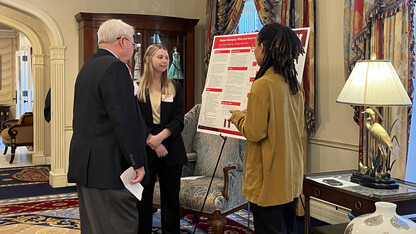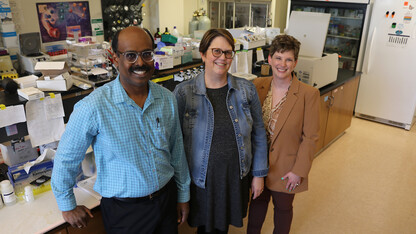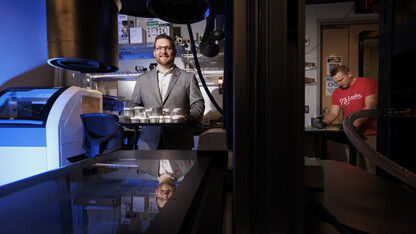· 3 min read
NU, Los Alamos partnership to strengthen biodefense instruction

A new partnership with Los Alamos National Laboratory is aimed at positioning the University of Nebraska as a leading educational site for students seeking careers in biodefense fields.
The project is being organized by NU’s National Strategic Research Institute, the only university-affiliated research center in the country dedicated to delivering solutions for combating weapons of mass destruction to U.S. Strategic Command and other federal agencies.
The partnership with the New Mexico-based Los Alamos Laboratory will specifically work to diagnose and detect infectious disease agents through the use of biosensors, analytical devices that convert a biological response into an electrical signal. Biosensors can be used for detecting biological and chemical warfare agents, including nerve gases and anthrax spores.
Leaders of the collaborative effort for the NU system is Ken Bayles, professor of pathology and microbiology at the University of Nebraska Medical Center; and Mark Riley, associate dean for research in the University of Nebraska–Lincoln’s College of Engineering.
“Our goal is to make the University of Nebraska the go-to place for biodefense education for students hoping to work for the Department of Defense,” Bayles said. “The vision is to build an education pipeline that starts at the undergraduate level and continues right on through the graduate level.”
In mid-March, key representatives from the partnering institutions met in Omaha for a mini-symposium.
“We are interested in technology development, new methods of analysis and modeling, and in translation and use of new schemes to monitor microbes in a variety of environments,” said Riley, a professor of biological systems engineering. “We are especially interested in connections of students at the graduate and undergraduate levels.”
Career applications from the new partnership will be numerous, ranging from public health areas and medical facilities, to manufacturing fields and municipal water systems.
Riley said the collaboration with Los Alamos is in its “infancy,” but is generating positive response from Nebraska faculty. He said 10 University of Nebraska–Lincoln faculty attended the Omaha symposium with more requesting information on how to get involved.
Los Alamos was established in 1943 as one of the sites of the Manhattan Project. Its single purpose was to design and build an atomic bomb. Today, the basic mission of Los Alamos is to maintain the safety, security, and reliability of the nation’s nuclear deterrent. The laboratory works on nuclear nonproliferation and border security, energy and infrastructure security, and countermeasures to nuclear and biological terrorist threats.
Harshini Mukundan, a scientist and team leader in the chemistry division, is leading the partnership for Los Alamos. Her research is focused on the development of diagnostic and surveillance strategies for emerging infectious diseases and drug-resistant organisms.
She called the partnership “a technology exchange” that would feature a variety of opportunities for Nebraska students to participate in internships at Los Alamos.
Other key Los Alamos scientists involved in the collaboration and their areas of expertise, include: Claudia Mora, chemistry; Scott White, program manager; Norman Doggett, biosciences; Benjamin McMahon, theoretical biology and biophysics; and Jessica Sutherland, post-doctoral student, microbiology and infection.
Learn more about NU’s National Strategic Research Institute.









